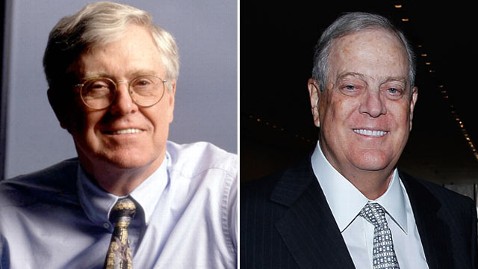If They Had a Billion Dollars …

The Koch brothers, Charles, left, and David, right, are billionaire businessmen who invest in the political process. (Getty Images).
How far can $1 billion get you in politics?
That's the magic number being thrown around - a Politico report says outside groups backing Republicans have pledged to spend that much money to influence the races for president and key congressional seats.
That money reportedly comes from super PACs like those run by GOP mastermind Karl Rove, the all-powerful Koch brothers and the head of the U.S. Chamber of Commerce.
$1 billion - well, it's enough to close Connecticut's budget deficit - six times.
It could fund one-seventh of the National Science Foundation.
It's enough to pay every senator his salary almost 6,000 times.
The 2012 primary has already proved how super PACs can be effective by raising and spending unlimited amounts of money. Mitt Romney won key primary races, for example, in large part because his super PAC savaged Newt Gingrich in ads in Florida, and later outspent Rick Santorum in Illinois by an enormous margin.
When turned on House and Senate races, that money can be even more powerful.
Consider, for example, that the race for California's 36th district between Republican Mary Bono Mack and Democrat Raul Ruiz already involves more than $4 million raised, and it's the ninth most expensive House race in the country out of 435. But $4 million doesn't seem like that much all of a sudden - the Koch brothers, for example, could decide to throw in $2 million to tip the race toward the Republican, accounting for nearly half of what's already been spent in that race, yet barely a drop in the bucket for the wealthy oilmen.
And that's in an expensive race. Take a look at the low end of outside spending and opportunity shines: Four House races in Michigan include just over $500 in independent expenditures so far, another dozen House races in other states have less than $10,000 spent, and another three dozen House races have included less than $100,000.
Or for a real example, look to southwestern Texas, where a longtime Democrat in the House was just ousted by a former city councilman who benefited from a super PAC that spent $240,000 against the incumbent.
Yesterday's billion-dollar report was just of pledges, not actual money raised, which might indicate that the Republican-aligned groups are trying to scare off their opponents, said Kathy Kiely, the managing editor of the Sunlight Foundation, a transparency group that estimates that super PACs have so far spent $116 million in the 2012 cycle.
"There were early rumors that President Obama would raise over $1 billion, and that doesn't seem like it's materializing," Kiely said. "There's reason to wonder whether this is more bluster than reality, but certainly we're going to see an enormous influx of money."
Romney's super PAC, Restore Our Future, has spent almost $50 million already - and that was before Romney officially clinched the nomination in the Texas primary on Tuesday. Already Romney has met with Sheldon Adelson, the billionaire casino magnate who gave millions of dollars to Newt Gingrich's super PAC, and who has indicated he will be just as generous to Romney's group to help him beat Obama.
The American Crossroads super PAC created by Rove has reported raising almost $30 million already.
Democrats have already turned on the counter-programming, trying to link Republicans with corporate interests that have deep pockets to spend influencing voters.
"This should be a wake-up call to middle class voters that Karl Rove and the Koch brothers are trying to buy elections and reward Republicans who push their extreme agenda," Steve Israel, the chairman of the Democrats' House races committee, said in a statement.
Obama is a fundraising juggernaut, but if he can't muster the money to compete with Republican outside spending, the best strategy might be to draw attention to that spending and call it a sign of corrupted politics. That might be hard, though, with his cabinet secretaries trying to raise money for Obama's own super PAC.
"Obama ran to be a different kind of candidate, a candidate who would take the influence of big money out of politics," Kiely said. "Do you go with the flow and try to fight fire with fire, or do you try to present yourself as a different kind of candidate?"